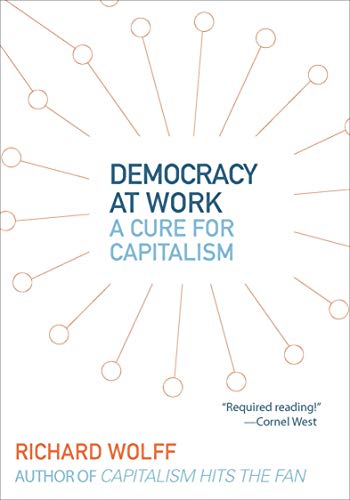Democracy at Work
A Cure for Capitalism
Richard Wolff
BOOK REVIEW

The gears of capitalism grind incessantly, often at the expense of the very souls who toil within its framework. In Democracy at Work: A Cure for Capitalism, Richard Wolff shatters the illusion of the "American Dream," urging readers to confront an uncomfortable truth: our economic system is in dire need of an overhaul. This isn't just a book; it's a rallying cry for a new economic paradigm that champions democracy in the workplace-a revolutionary concept that could redefine how we engage with our labor, our communities, and each other.
Wolff's incisive analysis delves deep into the roots of capitalism, skillfully illuminating how it perpetuates inequality and alienation. His argument resounds like a clarion call-what if we could engineer a system where workers themselves held the keys to their destinies? Where profits were not siphoned off by a select few, but shared amongst those who contribute to the creation of wealth? The implications of such a transformative vision could be nothing short of cataclysmic, shaking the very foundations of our society.
Picture a world where democratic procedures govern the workplace, where every voice carries weight, and the fruits of labor are collectively enjoyed. Wolff appeals to our latent ideals of justice and fairness, stirring emotions that have long been buried under the weight of corporate greed and exploitation. His vision envisions not just optional reforms, but a fundamental restructuring of our economic relationships.
Readers around the globe have found themselves polarized by Wolff's ideas. Many praise his passionate yet practical approach, viewing this work as an essential roadmap to emancipating workers from the shackles of capitalist oppression. Critics, however, argue that his proposals are impractical, rooted in an overly idealistic understanding of human nature and economic realities. Yet, one cannot dismiss the urgency with which he calls for dialogue around these issues, igniting conversations that might otherwise remain dormant.
Critically, Wolff doesn't just focus on the theoretical; he grounds his praise of workplace democracy in historical examples. The success stories from cooperatives across the globe demonstrate that, yes, there are alternatives to the tyrannical corporate model. From the worker cooperatives in Spain to the Mondragon Corporation, these instances provide a flicker of hope, a testament to the power of collective ownership and democratic management.
The backdrop of Democracy at Work is not merely academic; it emerges from the economic turmoil of the early 21st century, a time marked by crises that continue to haunt us today. As the inequalities widened and big corporations amassed unprecedented power, the urgency of Wolff's message only intensified. He speaks not just from an ideological standpoint, but as a compassionate observer of the suffering wrought by an unforgiving system.
Readers of all stripes have voiced their reactions. Some highlight the book's lucidity, pointing out how Wolff's direct and engaging prose invites even the most skeptical to ponder the realities of their workplace. Others contend that he oversimplifies complex economic constructs, glossing over the possible pitfalls of radical economic shifts. However, this clash of perspectives underlines a critical point: Wolff forces us to confront the narratives we accept without question.
As you traverse Wolff's pages, you are not merely reading; you are engaging in a fierce intellectual wrestling match. His words compel you to question your role within this systemic framework. Are you a cog in the machine or a builder of a new way forward? This is therapy for the weary worker, an awakening for those who have felt the sting of exploitation.
The emotional resonance of Democracy at Work lies in its insistence that change is not only possible; it's necessary. Wolff rouses the spirit of activism, driving home that a better future isn't a distant dream; it's a choice that can be made today. Will you stand in the shadows of the status quo, or will you step into the light of possibility? The question hangs heavy as you lay down the book, the echoes of Wolff's convictions bubbling to the surface of your consciousness.
In an era where cynicism permeates our discourse, Richard Wolff's work emerges as a beacon of hope, illuminating the paths toward a more equitable society. As you reflect on his ideas, remember this: to challenge capitalism is to dream boldly, to envision a world where democracy isn't just a political concept but a lived reality at work. Don't let the moment pass you by; embrace the challenge. Seek out Democracy at Work and see for yourself the powerful possibility it presents. Your future workplace self might just thank you.
📖 Democracy at Work: A Cure for Capitalism
✍ by Richard Wolff
🧾 189 pages
2012
#democracy #work #cure #capitalism #richard #wolff #RichardWolff